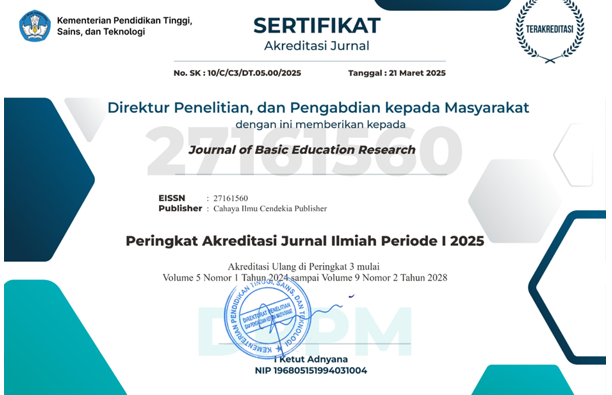The Impact of Parents’ Educational Level and Students’ Gender on Students’ Science Academic Achievement in Four Southeast Asian Countries
Abstract
Purpose of study: This paper aims at exploring the factors that affect the science academic achievement of Indonesia, Singapore, Thailand, and Vietnam students by using the PISA 2015 dataset.
Methodology: This paper uses a data mining method to explore the PISA 2015 data to answer the research questions and achieve the research aims. The targeted students were selected from ASEAN countries, including Indonesia, Singapore, Thailand, and Vietnam. The total number of samples was 26,703 students and their age ranged from 15.3 to 16.2.
Min finding: The results of this paper indicate parents’ educational level and students’ gender create significant differences in students’ science academic achievement in four Southeast Asian countries.
Novelty/Originality of this study: The paper intends to explore significant differences in the students’ science academic achievement, between parents’ educational level and students’ gender in four Southeast Asian countries.
References
Trinh, Q. V., & Weng, F., Y. “The impact of factors on mathematics performance of Vietnamese and Southeast Asian countries’ students – A comparative perspective”. Taiwan Education Review Journal, vol. 6, no. 11, pp. 66 – 84, 2017.
Brunello, G., & Checchi, D. “School quality and family background in Italy”. Economics of Education Review, vol. 24, no. 5, pp. 563 – 577, 2005.
Cameron, S. V., & Heckman, J. “The dynamics of educational attainment for black, hispanic, and white males”. Journal of Political Economy, vol. 109, no. 3, pp. 455 – 499, 2001.
Chang, C. Y., & Cheng, W. Y. “Science achievement and students’ self-confidence and interest in science: A Taiwanese representative sample study”. International Journal of Science Education, vol. 30, no. 9, pp. 1183 – 1200, 2008.
Kalender, I., & Berberoglu, G. “An assessment of factors related to science achievement of Turkish students”. International Journal of Science Education, vol. 31, no. 10, pp. 1379 – 1394, 2009.
Kleinjans, K. J. “Family background and gender differences in educational expectations”. Economics Letters, vol. 107, no. 2, pp. 125 – 127, 2010.
Senler, B., & Sungur, S. “Parental influence on students’ self-concept, task value beliefs, and achievement in science”. The Spanish Journal of Psychology, vol. 12, no. 1, pp. 106 –117, 2009.
Sullivan, A. “Cultural capital and educational attainment. Sociology”, vol. 35, no. 4, pp. 893 – 912, 2001.
Thomson, S. “Examining the evidence from TIMSS: Gender differences in year 8 science achievement in Australia”. Studies in Educational Evaluation, vol. 34, pp. 73 – 81, 2008.
Jabor, M. K., Machtmes, K., Kungu, K., Buntat, Y., & Nordin, M. S. “Does parent educational status matter on the students’ achievement in science?” Paper presented in the 2011 International Conference on Social Science and Humanity, Singapore.
Caldas, S. J., & Bankston, C. L. “The effect of school population socioeconomic status on individual student academic achievement”. Journal of Educational Research, vol. 90, pp. 269 – 277, 1997.
Mohammadpour, E. “A three-level multilevel analysis of Singaporean eighth-graders science achievement”. Learning and Individual Differences, vol. 26, pp. 212 – 220, 2013.
Akpinar, E., Yildiz, E., Tatar, N., & Ergin, O. “Students’ attitudes toward science and technology: An investigation of gender, grade level, and academic achievement”. In H. Uzunboylu, & N. Cavus (Eds.), World conference on educational sciences—New trend sand issues in educational sciences, 1, pp. 2804 – 2808. Amsterdam, Netherlands: Elsevier Science Bv., 2009.
Velayutham, S., Aldridge, J., & Fraser, B. “Gender differences in student motivation and self-regulation in science learning: A multi-group structural equation modeling analysis”. International Journal of Science and Mathematics Education, vol. 10, no. 6, pp. 1347 –1368, 2012
Hong, Z. R., & Lin, H. S. “An investigation of the students’ personality traits and attitudes toward science”. International Journal of Science Education, vol. 33, no. 7, pp. 1001 – 1028, 2011.
OECD. “The PISA 2003 assessment framework: Mathematics, reading, science and problem solving knowledge and skills”, 2003. Retrieved from https://www.oecd.org/edu/school/programmeforinternationalstudent assessment pisa/35188570.pdf
OECD. “PISA 2012 Results: What Students Know and Can Do - Student Performance in Mathematics, Reading and Science (Volume I)”, 2013. Retrieved from https://www.oecd.org/pisa/keyfindings/pisa-2012-results-volume-I.pdf
OECD. “PISA 2015 Results in Focus”. Paris: OECD Publications, 2016.
Ababneh, E. G., & Abdel Samad, M. M. “Gender gap in science achievement for Jordanian students in PISA2015”. European Journal of Educational Research, vol. 7, no. 4, pp. 963-972, 2018. doi: 10.12973/eu-jer.7.4.963
Chiu, M. S. “Effects of a women-in-sciences/men-inhumanities intervention on Taiwanese adolescents’ attitudes towards learning science”. The Asia – Pacific Education Researcher, vol. 20, no. 2, pp. 322 – 335, 2011.
Liu, O. L., Lee, H. S., & Linn, M. C. “An investigation of teacher impact on student inquiry science performance using a hierarchical linear model”. Journal of Research in Science Teaching, vol. 47, no. 7, pp. 807 – 819, 2010.
Pomerantz, E. M., Altermatt, E. R., & Saxon, J. L. “Making the grade but feeling distressed: Gender differences in academic performance and internal distress”. Journal of Educational Psychology, vol. 94, pp. 396 – 404, 2002.
Tindara, A., Maria, L. D. T., & Anna, M. “Education capability: A focus on gender and science”. Social Indicators Research, vol. 128, no. 2, pp. 793 – 812, 2016.
Tsai, L. T., Yang, C. C., & Chang, Y. J. “Gender differences in factors affecting science performance of eighth grade Taiwan students”. The Asia - Pacific Education Researcher, vol. 24, no. 2, pp. 445 – 456, 2015.
Copyright (c) 2020 Quang-Vinh Trinh

This work is licensed under a Creative Commons Attribution-NonCommercial 4.0 International License.
Authors who publish with this journal agree to the following terms:
- Authors retain copyright and acknowledge that the Journal of Basic Education Research is the first publisher licensed under a Creative Commons Attribution 4.0 International License.
- Authors are able to enter into separate, additional contractual arrangements for the non-exclusive distribution of the journal's published version of the work (e.g., post it to an institutional repository or publish it in a book), with an acknowledgment of its initial publication in this journal.
- Authors are permitted and encouraged to post their work online (e.g., in institutional repositories or on their website) prior to and during the submission process, as it can lead to productive exchanges and earlier and greater citation of published work.





.png)


.png)
.png)


















